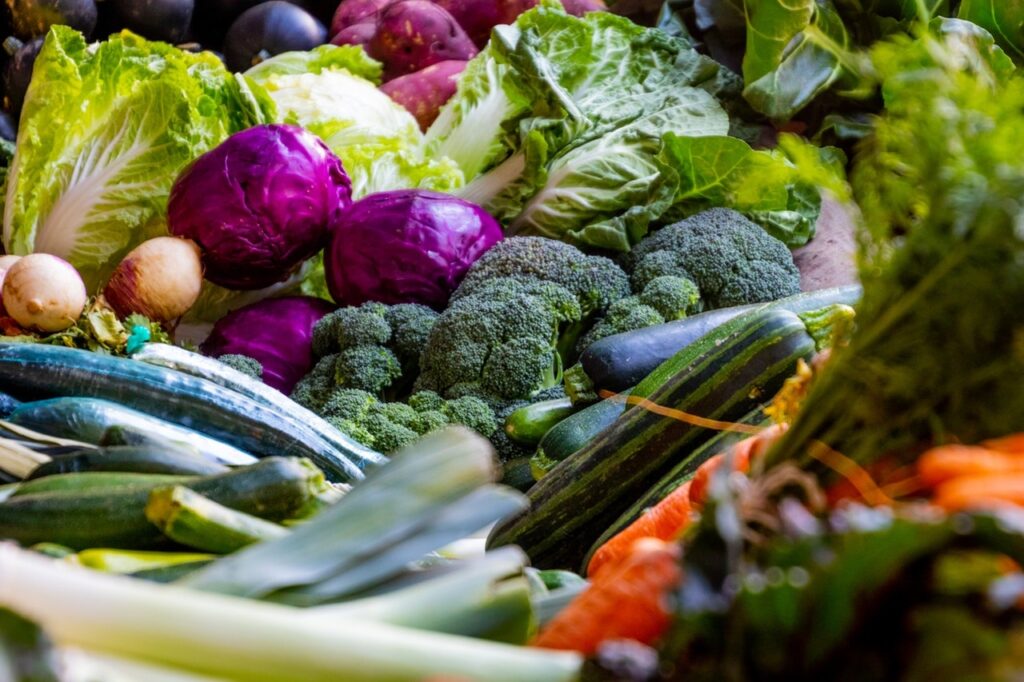
Is organic food healthier?
The consumption of organic food is continuously growing. In the last twenty years the organic farming sector has quintupled worldwide, both in the number of hectares dedicated to it and in its economic value. [1]
However, since its inception, voices have been raised for and against this type of food, with an argument that is always repeated in the debate: organic food is healthier than conventional one.
However, is that true? In this article we will answer this question with everything that is known so far.
But first, if you are not sure what exactly “organic food” is, or how you can tell if you are buying a real organic product, take a look at our article on it.
What is a healthy food?
Before we can say whether organic food is healthier or not, we must first clarify what “healthy food” means.
We are used to hearing, for example, that vegetables are healthy and that pizza and sweets are not. This, which may seem obvious and common sense to you, is just the current prevailing view of what “healthy food” means. But this view was different just a few years ago and will possibly be different in the future.
The world of nutrition is ever-changing and, although increasingly rigorous, it is sometimes influenced by corporate interests and popular trends.
A famous example is the trend concerning eggs, whose consumption was linked for decades to high blood cholesterol levels and increased risk of heart attack. However, an extensive meta-analysis published in 2016 showed that this relationship was wrong and that the consumption of eggs can even reduce the risk of suffering a stroke. [2]

Another case, this time of corporate manipulation, is that of sugar. For years, the U.S. sugar industry, through the “Sugar Association”, financed nutritional studies that hid or minimized the dangers of eating sugar, with the aim of promoting its consumption. [3]
As we can see, there is a lot of misinformation and preconceived ideas even about conventional foods, which makes it even more difficult to compare them with organic ones. That is why, first of all, it is important to understand that there are no healthy foods but rather healthy uses of food.
Healthy diet, not healthy food
Every day, the human body needs to obtain a certain amount of energy, proteins, carbohydrates, fats, vitamins, minerals and other elements to function optimally. The exact amount of these nutrients is different for each person depending on their genetics, age, sex, physical activity, diseases, etc.
In general, food that is considered “healthy” is the one that has a higher proportion of essential nutrients and therefore allows us to reach our daily amount easier.
However, no food by itself possesses all the nutrients we need, so we must consume a combination of them. This is what we know as “diet”.
The problem is that, in the same way that not reaching our daily amount of nutrients has negative effects on our body, exceeding this amount is also bad for us. And, while food that is considered “unhealthy” makes it easier for us to exceed these limits (for example, those containing trans fats), this can also happen even if our diet consists only of “healthy” food.
Therefore, it is not appropriate to talk about healthy or unhealthy food, but rather about diets that are more or less healthy depending on personal needs.
The key to a healthy diet is the quantity and variety of the food that make it up. Knowing our nutritional needs is vital to consume a range of foods that allow us to achieve them, but without exceeding them too much.
Okay, now we know that no food is really healthier than other. But even so, we still want to know if organic food is healthier than conventional food!
How can we compare this? We have looked at 3 factors that directly and indirectly affect our health: nutritional density, external substances and environmental impact.
Nutritional density
Nutritional density is the amount of nutrients in a given volume of food.
As we saw earlier, food contains the nutrients our bodies need throughout the day, so one way to compare whether organic food is “healthier” would be to see if it contains more nutrients than its conventional counterpart.
To answer this, we have looked at the main systematic reviews and meta-analyses carried out on this subject, i.e. studies that analyse hundreds or thousands of articles published on the health effects of consuming organic foods and summarise the findings obtained from them.
Summary:
- Organic dairy products and meats contain up to 50% more omega-3, however, studies warn that this difference has hardly any noticeable effect on health [4].
- No significant differences in the amount of vitamins and minerals in organic versus conventional food have been found [4].
- Organic foods may contain up to 26% more phenolic compounds, substances that could prevent the occurrence of some diseases. However, their effects on health are not yet well understood [4].
- Organic foods have higher concentrations of antioxidants [5].
- Food from organic crops have lower amounts of protein and amino acids, but studies show that this difference is too small to have significant health effects [5].
Conclusion: Consuming organic food with the aim of obtaining more nutrients does not make sense with the information currently available.
External substances

In addition to the substances naturally found in food, other elements can end up in it due to the processes used to produce it.
Traces of pesticides, heavy metals, antibiotics, hormones, additives, etc. These are present in many foods and their prolonged consumption can cause them to accumulate in our bodies to levels that are dangerous to our health.
Therefore, another way of comparing whether organic food is healthier would be to compare the amount of dangerous external substances with conventional food. Again, we have reviewed the main studies on this subject.
Summary:
- Organic food contains, on average, 48% less cadmium, a highly toxic metal that accumulates in the liver and kidneys. This difference seems to be mainly related to the different use of fertilisers in organic farming [5].
- Organic crops contain lower amounts of nitrogen and higher amounts of phosphorus, but these differences have no direct relevance to human health, according to the researchers [5].
- Pesticide residues were four times lower in samples of organic food than in conventional food [5].
- Consumption of organic food may be associated with a lower risk of allergies, but the evidence is not yet conclusive [4].
- A significant reduction in the risk of non-Hodgkin’s lymphoma was observed in participants who regularly or always consume organic food compared to people who never consume it [4].
- Animals from organic farms are less likely to develop certain diseases related to intensive production typical of conventional farms. Consequently, fewer antibiotics are needed to treat diseases during animal husbandry and their use is strongly restricted by organic production regulations. This reduces the risk of the development of antibiotic resistance in bacteria [4].
Before moving on to the conclusion of this section, something important should be mentioned: the meta-analyses highlight the scarcity of studies comparing the levels of pesticide residues in organic and conventional crops, as well as deficiencies in the preparation of some of the published studies.
Conclusion: More comprehensive studies are needed to be able to assess in depth the positive health effects of consuming organic food. Furthermore, due to the increasing antibiotic resistance among the population, the absence in many countries of comprehensive controls on the presence of dangerous pesticides in food and the lack of consensus on their long-term health effects, the consumption of organic products as a way to reduce the intake of these substances seems justified.
Environmental impact
Another way to measure the health benefits of food is to analyse the environmental impact of its lifetime, from its origin until it reaches your plate.
However, this analysis is very complex and encompasses many different factors so we are going to dedicate a whole article to it.
References
- «The World Trends of Organic Production and Consumption«, Yurii Kyrylov, Stanley R. Thompson, Viktoriia Hranovska, Viktoriia Krykunova, 2018
- «Meta-analysis of Egg Consumption and Risk of Coronary Heart Disease and Stroke«, Alexander DD, Miller PE, Vargas AJ, Weed DL, Cohen SS, 2016
- «Sugar Industry and Coronary Heart Disease Research«, Cristin E. Kearns, Laura A. Schmidt, Stanton A. Glantz, 2016
- «Human health implications of organic food and organic agriculture: a comprehensive review«, Axel Mie, Helle Raun Andersen, Stefan Gunnarsson, Johannes Kahl, Emmanuelle Kesse-Guyot, Ewa Rembiałkowska, Gianluca Quaglio, Philippe Grandjean, 2017
- «Higher antioxidant and lower cadmium concentrations and lower incidence of pesticide residues in organically grown crops: a systematic literature review and meta-analyses«, Marcin Barański, Dominika Średnicka-Tober, Nikolaos Volakakis, Chris Seal, Roy Sanderson, Gavin B. Stewart, Charles Benbrook, Bruno Biavati, Emilia Markellou, Charilaos Giotis, Joanna Gromadzka-Ostrowska, Ewa Rembiałkowska, Krystyna Skwarło-Sońta, Raija Tahvonen, Dagmar Janovská, Urs Niggli, Philippe Nicot, Carlo Leifert, 2014